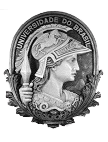The Limnology Laboratory of UFRJ was created in the Biology Institute, 1989, when Prof. Francisco de Assis Esteves came transferred from the Federal University of São Carlos (UFSCar). He brought three of his Ph.D. students at the time: Reinaldo Luiz Bozelli, Fabio Roland and Marina Suzuki. Shortly afterwards, the then undergrad Renata Panosso arrived. She would later become the first student of the newly created Graduate Program in Ecology, UFRJ. This small team transformed an underground warehouse in a limnology lab in 18 months.
While getting settled, the team drafted several projects to study the coastal lagoons of northern Rio de Janeiro, and conceived what later would become the Graduate Program in Ecology (PPGE/UFRJ)..
In those early days, field research was concentrated in the municipality of Macaé, where one can find a variety of lakes and lagoons. Very soon it became clear that the pressing expansion of the oil economy in the region would demand the presence of other research groups to help address the challenge of subsidizing sustainability know-how to the local economic development.
Two of the main outcomes of the first fifteen years of activities in the region were the creation of the Restinga de Jurubatiba National Park, the only one protecting resting ecosystem in the country, and of the Center for Ecology and Socio-Environmental Development of Macaé (NUPEM/UFRJ), currently called Institute for Biodiversity and Sustainability (NUPEM/UFRJ).
Nowadays, we have two headquarters: one in the Campus Ilha do Fundão/UFRJ, in the city of Rio de Janeiro, and another at the city of Macaé, at NUPEM/UFRJ. However, the activities of the lab spread across the country, comprising studies related to biodiversity, nutrient cycling and ecosystem restoration of freshwater ecosystems. Our goal is to produce knowledge applicable to conservation and management of aquatic ecosystems and to provide high level formation in Ecology and Limnology.
Therefore, two of our foundations are:
a) to conceive and undertake projects committed to scientific development in the field of limnology, aligned with the conservation of freshwater ecosystems and with a positive social impact;
b) to provide high level training and formation of future professionals, based on the best available science and ethical principles, who can later become leaders in academia, governments, corporations, and in the organized civil society.
Along those guidelines, and over 30 years of activities, our team has been providing relevant services to the environment, to education and to science and technology.



